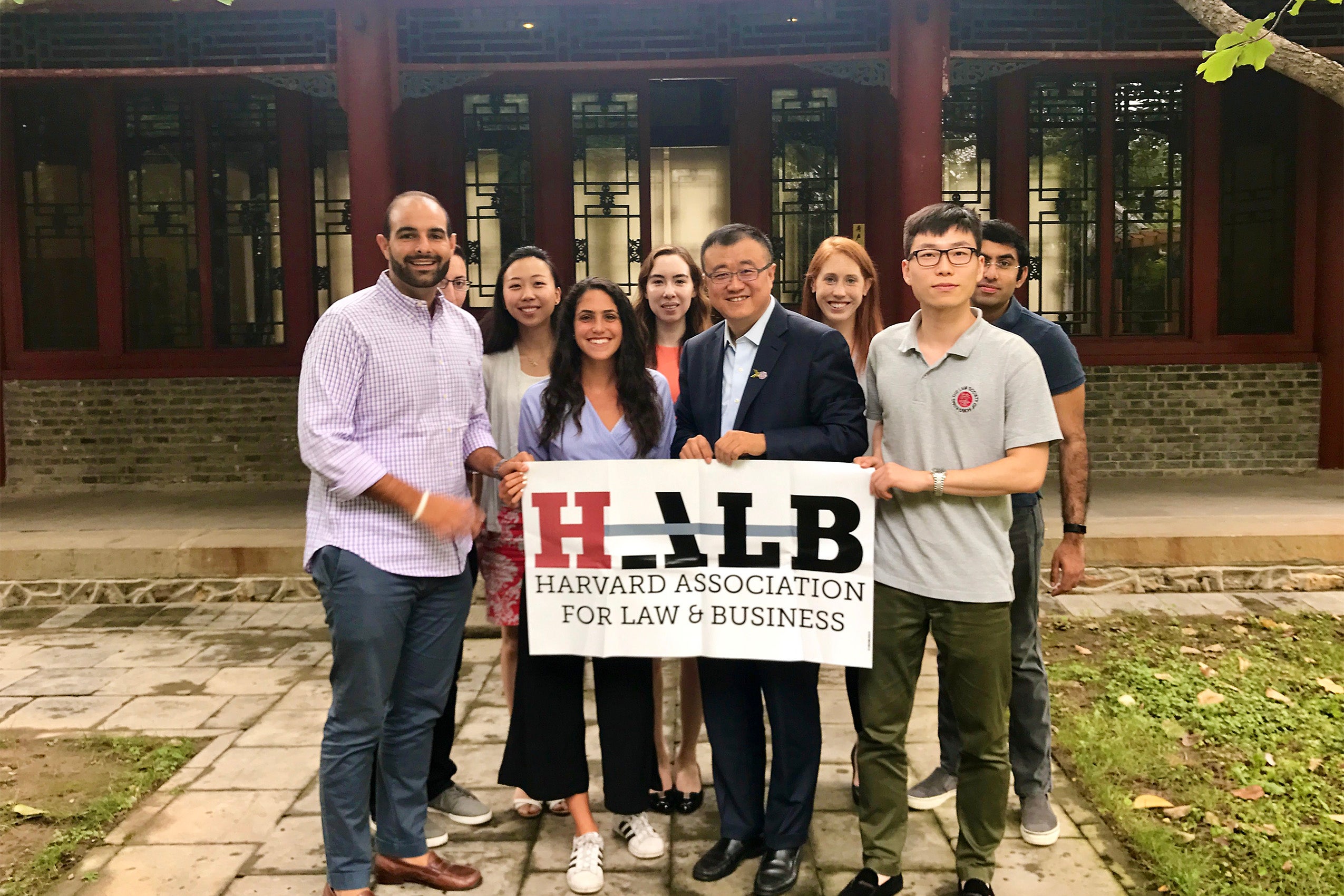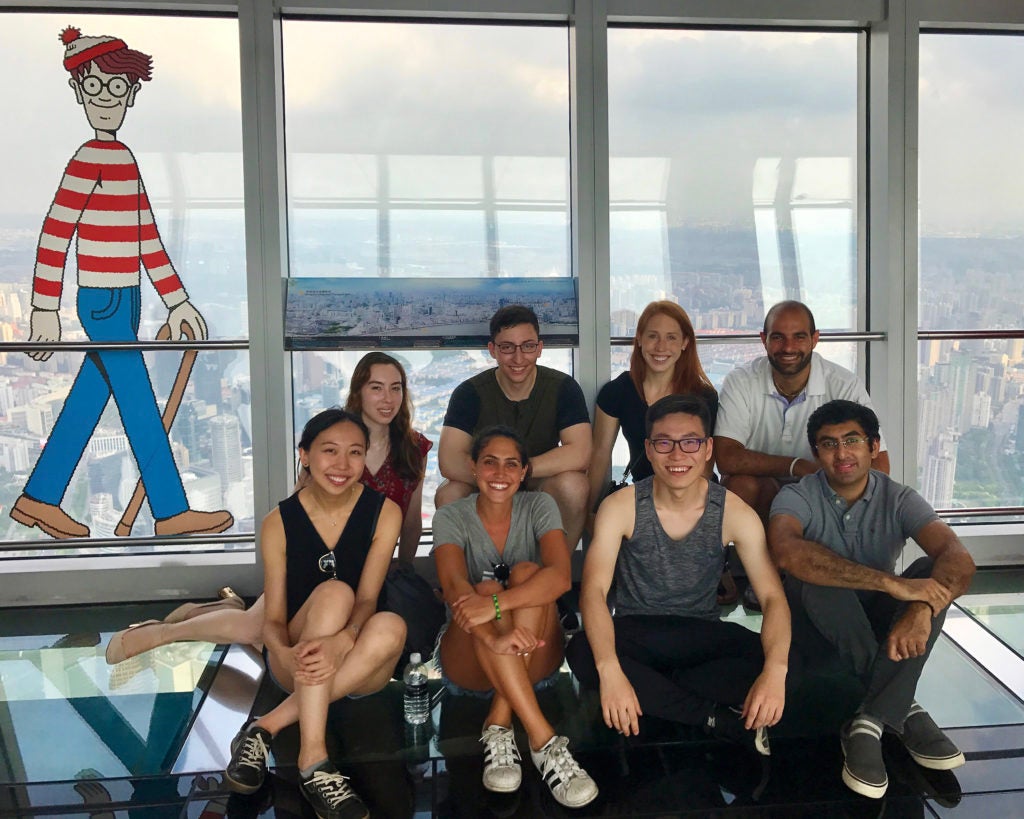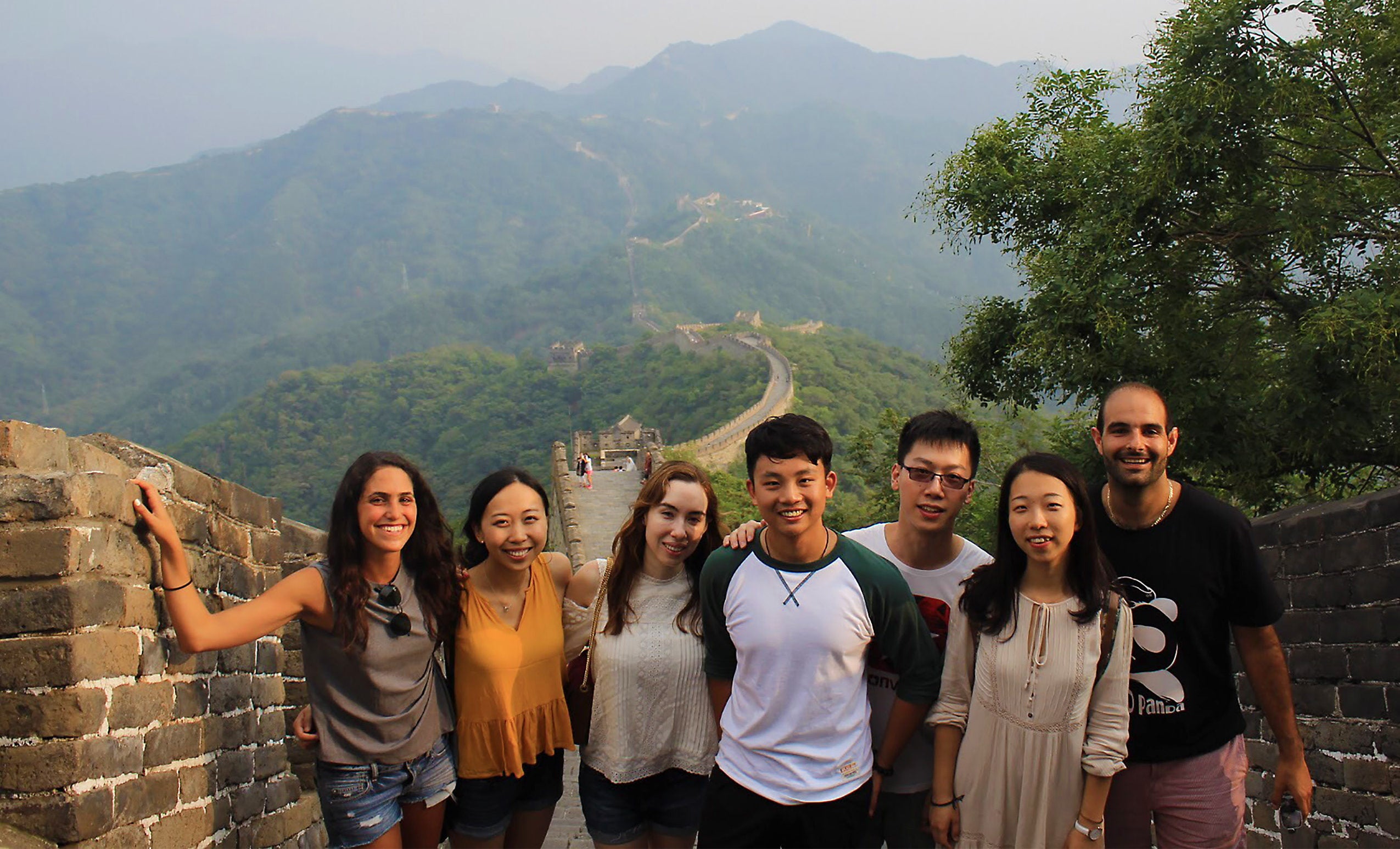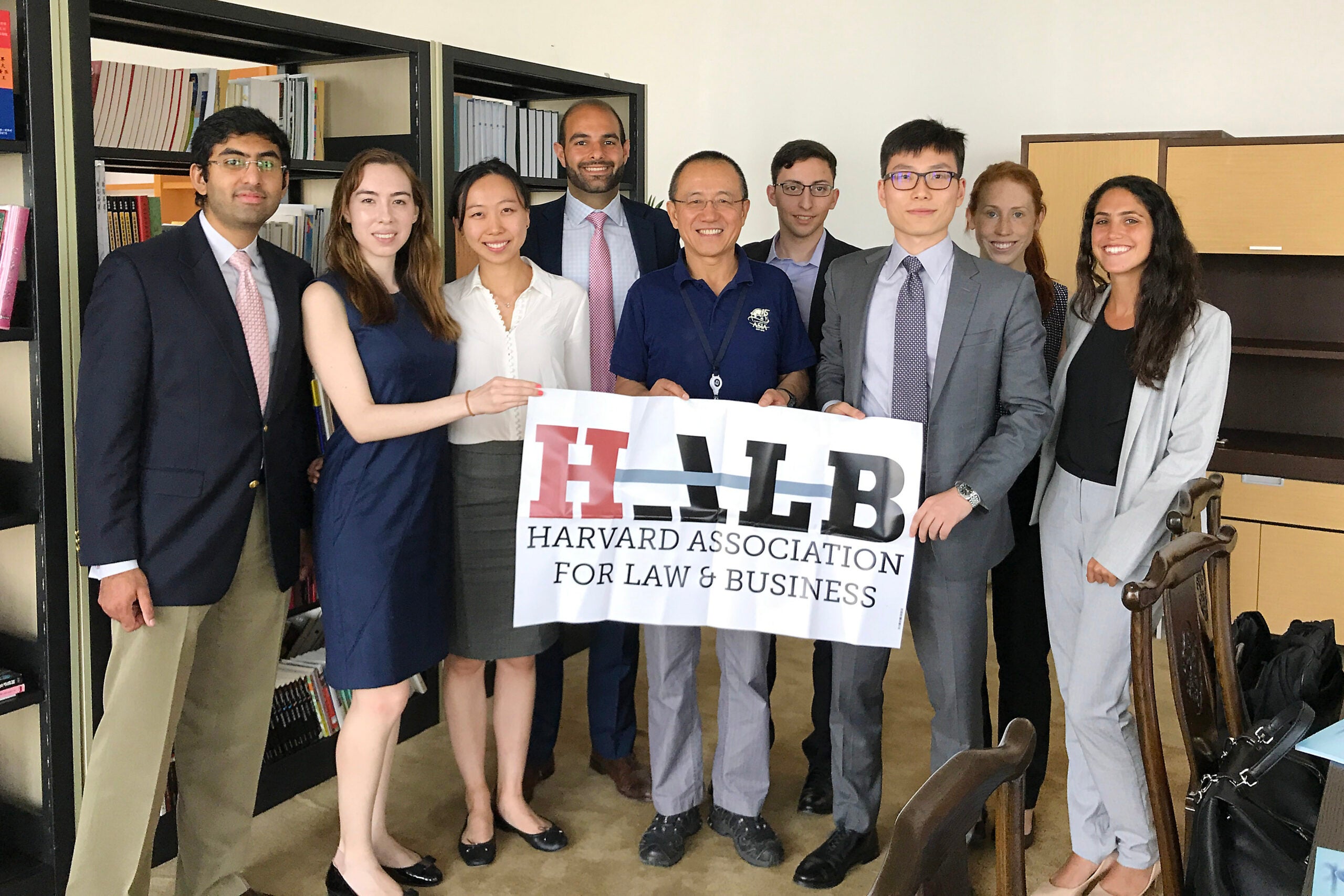By Aviv Lazar ’18 and David Kafafian ’18
On Aug. 28, a student delegation from the Harvard Association for Law and Business (HALB) embarked on a week-long trip through Shanghai, Hangzhou, and Beijing, China. The purpose of this first-ever HALB China Trek was to expose students to the unique lessons from the rapid development of China’s global economy.
In prior years, HALB members have met with legal and business leaders in Boston and New York City, but this year, HALB Co-presidents Jianjian Ye ’18 and David Kafafian ’18 decided to find an opportunity for students to explore firsthand one of the world’s fastest growing economies.
“The core mission of HALB is to connect students with leaders at the intersection of law and business and to cultivate leadership,” said Ye. “In today’s world, it is imperative for us to understand our mission in a more globalized context. This China Trek exemplifies our efforts to offer more opportunities to our members to learn about global leadership.”
Ye, a Hangzhou native, designed the itinerary and led the trek. Inspired by Professor William Alford’s comparative law class on China, he sought to highlight the tremendous growth of the Chinese economy since 1978, when the country effectively opened its economy to the rest of the world. He arranged for students to meet with key figures in founding China’s capital markets, as well as leaders across technology, government and charity.
The delegation began the trip with a visit to the Shanghai Stock Exchange, where students met with Hao Fu, director of the International Business Development Department. Fu walked students through the development of the Exchange and discussed future plans to attract more foreign capital and companies to the Chinese stock market.

Among the business and education leaders the HALB student delegation met on their China Trek was Professor Bin Yang of Tsinghua University in Beijing. Here, students had the opportunity to learn about the history and future of Chinese education, and about Tsinghua’s international collaboration plans, including the Schwarzman Scholars program, the Global Innovation Exchange, and Tsinghua-Berkeley Shenzhen Institute.
In Hangzhou, the students met with the legal team of the Alibaba Group, the $400 billion tech behemoth founded by Jack Ma. Sitting across from attorneys who supported Alibaba’s Taobao.com, Tmall.com and Alibaba Cloud businesses, students learned how effective attorneys provide counsel in a “build things fast and break them faster” environment. The Alibaba team offered lessons regarding the interplay between law and technology, and also shared the challenges they faced when managing the firm’s global intellectual property portfolio.
The following day, Professor Xiqing Gao, former president and chief investment officer of the China Investment Corporation (CIC) in Beijing met with the students to discuss the past and future of the Chinese economy. Gao has been a significant leader in China’s path from a planned economy towards today’s “market economy with Chinese characteristics.” In the 1980s, after he practiced as an attorney in New York, Gao helped convince the Chinese government to establish a stock market and served as the first General Counsel for the China Securities Regulatory Commission (CSRC). Later in his career, he helped create the CIC, China’s now $800 billion sovereign wealth fund. “It was truly memorable to meet someone who played such a significant role in structuring China’s current economy, though you would not guess that based on his humble demeanor,” says Arjun Adusumilli ’18.
Weiwei Hua, general counsel of CIC, and her in-house team gave the HLS delegation a comprehensive introduction to the goals and strategies of CIC, as well as insights into the various legal challenges CIC attorneys have faced when investing overseas.
To gain a more comprehensive understanding of the role of internationally trained attorneys practicing in Asia, the student visited the Beijing office of Davis Polk & Wardwell LLP. Davis Polk partners Howard Zhang and Li He welcomed students and shares their experience building a successful full-service practice in China.
Students also met with Professor Bin Yang, vice-president and provost of Tsinghua University, to learn about the history and future of Chinese education and Tsinghua’s international collaboration plans, including the Schwarzman Scholars program, the Global Innovation Exchange, and Tsinghua-Berkeley Shenzhen Institute. “Educating global leaders,” he said, “is an important goal of Tsinghua University.”
HLS students participated in an open forum discussion with Tsinghua law students, led by Professors Guobin Cui and Guohua Yang. The animated discussion focused on the differences between legal practice in the United States and China, perspectives on both country’s economic and geopolitical positions, as well as benefits and drawbacks to both types of legal systems. Later the HLS delegation toured the campuses of Tsinghua University and Schwarzman College.
On Friday, students met with Chairman Jianxi (Jesse) Wang of the Beijing Dalio Public Welfare Foundation (BDF), and visited the Dandelion School, a charity supported by the BDF, which provides a home and education to the children of local migrant workers. Wang also played a key role in establishing the stock market in China and served as the first chief accountant for the CSRC. He later served as the chairman of China International Capital Corporation (CICC) as well as the vice president and chief risk officer at CIC. Students had an open discussion with Wang about the evolution of China’s market economy, the lessons from China’s reform, and the U.S.-China relationship.
The final meeting of the week was held at the CSRC, where Dongping Li, vice president of the China Institute of Finance and Capital Markets, greeted students with a passage from the Analects of Confucius: “It is always delightful to have friends come visit from afar.” Students said Li’s greeting was emblematic of the type of welcome they received throughout their visits in China. Li then illustrated the roles and goals of the CSRC as well as China’s approach in preventing systematic risks in its economy.
Meetings across the trip provided students with valuable perspective on a country they found both similar and different.
Aviv Lazar ’18 noted how “almost every meeting turned into a robust discussion that helped us reconcile China’s free-market like economy with its political system.” Elizabeth Ferrie ’19 said: “We wanted to learn how big corporations were being regulated in China, what types of policies were being used to encourage the growth of business, how they viewed the U.S.-China relationship, and the effect the opening of the market had on the greater Chinese population, and to the extent possible, I think we found those answers.”

The HALB student delegation enjoyed a week in Shanghai, Hangzhou, and Beijing, China for the first-ever HALB China Trek. The student participants from left-to-right, back-to front were: Elizabeth Ferrie ’19, Jake Sussman ’18, Madison McGreal ’18, David Kafafian ’18, Tracy Cui ’19, Aviv Lazar ’18, Jianjian Ye ’18, and Arjun Adusumilli ’18

After a week of meetings with private and public sector leaders, HALB’s members enjoyed a visit to the Great Wall along with current students from Tsinghua University.
Many of the speakers delved deeply into Chinese history, discussing the founding of the People’s Republic of China and its early policies of planned economy, before addressing current issues and questions about the future. As Professor Bin Yang of Tsinghua University explained, “If you ask a Chinese about the future, they often start by talking to you about our history.” Recognizing the unique history, culture and politics of China, students better understood how China has integrated market economy with its centralized political system.
“We had the best one-week crash course to a country that anyone could ask for,” Kafafian said. “We tried the food, met the people, saw the sites, and met the leaders who helped bring the country to where it is today, as well as those who are shaping its tomorrow. Experiences like this are exactly what I hoped to find at HLS.”
The 2017 HALB China Trek was generously sponsored by Davis Polk & Wardwell.
